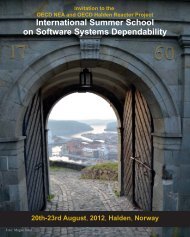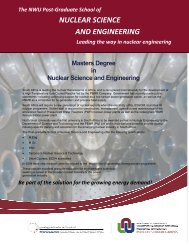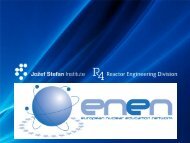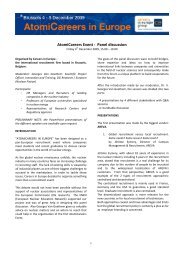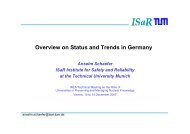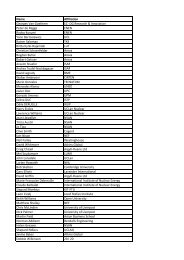Annex I Description of Work (April 2007) - ENEN Association
Annex I Description of Work (April 2007) - ENEN Association
Annex I Description of Work (April 2007) - ENEN Association
- No tags were found...
Create successful ePaper yourself
Turn your PDF publications into a flip-book with our unique Google optimized e-Paper software.
Euratom 2005-6 – Fixed deadline<br />
Coordination Actions<br />
<strong>ENEN</strong>-II<br />
They are also important for meeting the challenges presented by unpredicted nuclear events<br />
(e.g., the Windscale fire, Chernobyl accident, terrorist and sabotage activities). In order to<br />
mitigate the effects <strong>of</strong> this decline the EURAC project identified remaining capabilities within<br />
the EU higher education sector, identified a need for about 100 trained specialists per year and<br />
proposed three European Masters courses that would meet the identified need. The <strong>ENEN</strong>-II<br />
project will expand education and training activities into those fields and mobilise the<br />
identified, existing fragmented capabilities to form the critical mass required to implement the<br />
courses and meet the radiological protection, radioecology and analytical radiochemistry<br />
postgraduate education needs <strong>of</strong> the European Union. In order to achieve the above it will be<br />
necessary to finalise a detailed syllabus for each <strong>of</strong> the proposed degrees and identify<br />
education institutions providing the course/module materials that are required to teach it, and<br />
having the laboratory facilities and equipment for practice training and research. Gaps in the<br />
curricula will have to be filled by developing, validating and having accredited the missing<br />
course modules.<br />
Until now, education and training in waste management and underground storage were not<br />
addressed by these projects. Although the waste management is only a corner <strong>of</strong> the whole<br />
nuclear activities, the lack <strong>of</strong> commitment in this field is worrying, especially since the study<br />
<strong>of</strong> radioactive waste storage is a complex subject that requires an ever-increasing conjunction<br />
<strong>of</strong> different scientific disciplines. Moreover, difficulties exist <strong>of</strong> achieving scientific and<br />
technical consensus in this field. Indeed, growing environmental awareness lead to make<br />
difficult the social endorsement <strong>of</strong> any real waste storage solution without formal scientific<br />
demonstration <strong>of</strong> its safety. In this frame, available fundamental knowledge on numerous<br />
phenomena, particularly on coupled phenomena governing the behaviour <strong>of</strong> the underground<br />
disposal has still to be improved and requires sustainable academic researches.<br />
The need for an important educational effort directed towards increasing the research capacity<br />
is obvious however, as very little specific programmes are available in the European<br />
universities. Besides, the fall in the number <strong>of</strong> PhD students on the one hand and the rise <strong>of</strong><br />
the average age <strong>of</strong> the faculty members on the other hand, leads us to anticipate imminent<br />
problems for the continuation and renewal <strong>of</strong> the skilled teams in several countries. Faced<br />
with this situation, the <strong>ENEN</strong>-II project will expand education and training activities and<br />
promote inter-university collaboration aimed at creating a common educational programme<br />
on the radioactive waste disposal, compatible with the European educational road map<br />
(Bologna declaration). The project will construct a common educational programme for<br />
radioactive-waste storage both by considering the diversity <strong>of</strong> the scientific issues involved<br />
and by anticipating the future needs <strong>of</strong> stakeholders in term <strong>of</strong> competence. As the long-term<br />
goal is to promote academic research, the courses encompassed in the programme will be<br />
targeted for delivery at the final year <strong>of</strong> Engineering and second year <strong>of</strong> Master (MS) degree,<br />
in order to arouse students’ interest in pursuing radioactive-waste storage studies in third<br />
academic cycle (PhD level. The common educational programme will be tested by organising<br />
pilot sessions in four <strong>of</strong> the universities adhering to the project. The methodology adopted for<br />
teaching consists in using multi-media facilities for broadcasting in live each lecture taught in<br />
one <strong>of</strong> the partner universities to the other partners. In this cost-effective way all the students<br />
will receive the same pedagogic programme independently <strong>of</strong> their geographic situation.<br />
Moreover, the outcome assessment <strong>of</strong> the pilot sessions will be facilitated by using the same<br />
evaluation criteria regardless to the specific constraints in each university.<br />
“Expand” will thus include the development <strong>of</strong> networking within the <strong>ENEN</strong> <strong>Association</strong> to<br />
cover additional fields, e.g. reactor safety, and by establishing new networks, for example for<br />
radiochemistry, radioecology and the geological disposal and underground storage <strong>of</strong><br />
<strong>Annex</strong> I <strong>Description</strong> <strong>of</strong> <strong>Work</strong> - page 9 <strong>of</strong> 124



